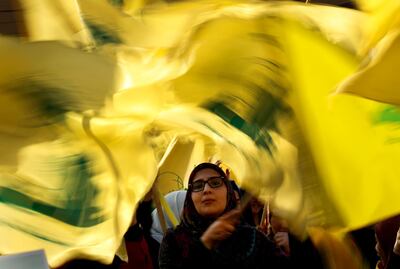The UK government plans to outlaw Lebanon’s Hezbollah to stop its supporters parading in the streets and put pressure on Iran.
Home Secretary Sajid Javid laid a draft order in parliament on Monday that aims to proscribe the organisation as a whole and put an end to the distinction between the group’s military wing – which is listed as a terrorist group – and its political wing.
From Friday, anyone who is a member, or invites support for Hezbollah, faces up to 10 years in prison if the order is passed by parliament.
“Hezbollah is continuing in its attempts to destabilise the fragile situation in the Middle East and we are no longer able to distinguish between their already banned military wing and the political party," Mr Javid said.
“Because of this, I have taken the decision to proscribe the group in its entirety.”
Hezbollah’s military wing was banned in 2008, but calls to outlaw the group’s political wing had so far been largely disregarded in Europe under the token that such action would damage relations with the Lebanese government, which Hezbollah is a part of.
Lebanese politicians agreed in January to a new government which includes three Hezbollah ministers, ending an impasse that lasted for eight months after the country held elections in May 2018.
The European Union voted to add the military wing of Hezbollah to its list of proscribed terrorist organisations in July 2013, with the aim of maintaining contact with the political wing of Hezbollah and keeping humanitarian aid flowing to Syrian refugees in Lebanon.
Hezbollah is already considered a terror group in its entirety by the US, Canada, Israel and the Arab League.
The ban would support the British government’s claim that it is closing down all so-called safe spaces for terrorism.
It would also prevent Hezbollah supporters from waving their flags in the streets of central London on the occasion of Quds Day, an annual event held on the last Friday of Ramadan initiated by Iran to denounce Zionism and Israel.
“My priority as Home Secretary is to protect the British people. As part of this, we identify and ban any terrorist organisation which threatens our safety and security, whatever their motivations or ideology which is why I am taking action against several organisations today,” Mr Javid said.
The move comes as Foreign Secretary Jeremy Hunt attempts to pressure Iran – of which Hezbollah is a proxy in Lebanon – to release the dual national Nazanin Zaghari-Ratcliffe, who has been detained in Iran since April 3, 2016, under espionage charges.
Mr Hunt has repeatedly accused Iran of using the jailed mother and charity worker as a diplomatic pawn.

Mr Hunt argued that Hezbollah makes no distinction between its political and military wing and the British government should do the same.
“We are staunch supporters of a stable and prosperous Lebanon. We cannot, however, be complacent when it comes to terrorism – it is clear the distinction between Hezbollah’s military and political wings does not exist, and by proscribing Hezbollah in all its forms, the government is sending a clear signal that its destabilising activities in the region are totally unacceptable and detrimental to the UK’s national security,” Mr Hunt said.
The British government also accused the organisation of amassing weapons in contravention of UN Security Council resolutions and of prolonging “the conflict and the regime’s brutal and violent repression of the Syrian people”.
There was no immediate reaction from Hezbollah to the British move.
Banning the group entirely has been a long-standing demand of the British Jewish community and Conservative MPs are thought to see this move as an opportunity to demonstrate the party’s tough stance towards anti-semitism.
The UK government’s proposal also proscribes Ansaroul Islam, a militant extremist group active in Burkina Faso and in Mali, and Jamaat Nusrat al-Islam Wal-Muslimin, a militant organisation in the Maghreb and West Africa that includes the Saharan branch of Al Qaeda in the Islamic Maghreb.

